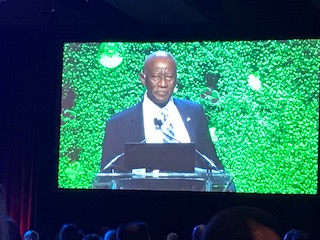
‘The situation is not acceptable,’ Martin Rapaport says.
LAS VEGAS — Morie Manyeh, new minister of mines and mineral resources for Sierra Leone, implored the JCK breakfast crowd at the annual Rapaport breakfast on Sunday to help ensure the country’s diamond trade begins to benefit the people who live there.
“For all the diamonds that have come out of our country, I don’t know what we have to show for it,” Manyeh said. “Help us stand on our own two feet. We are tired of handouts. Botswana has managed their diamonds better than we have. We want a better life for ourselves and a brighter future for our children.”
Manyeh says diamond-producing regions of the country lack water, decent schools, hospitals and good roads.
“It is only fair that we get some return to make Sierra Leone a better place to live. I know what it means to be poor in the midst of riches. I know what it means to be deprived when there’s no reason for that at all.”
During the breakfast, Martin Rapaport, Rapaport chairman, decried the lack of transparency in the diamond supply chain and the persistence of “dirty” diamonds in the marketplace.
“There is something fundamentally wrong with this industry,” he said. “There are attempts by larger companies to push out smaller companies” in the distribution of diamonds.
Advertisement
“There are attempts by the leadership of the diamond industry to greenwash diamonds and not take action to eliminate human rights, money laundering and terrorist-funding abuses. The leadership of the diamond industry says things are OK when they are not. The situation is not acceptable.
“You have to know where your money is going,” Rapaport said. “I don’t know that we’re NOT feeding terrorist organizations.” He said the international money trail is opaque and source certificates for many Kimberley Process polished diamonds aren’t available.
Rapaport said that if small and medium-size U.S. retailers and suppliers don’t become directly involved and find out exactly where their diamonds are coming from, they will be squeezed out of the market as consumers increasingly demand assurances their diamonds are ethically mined. “Build relationships with people who are on the supply side,” he said. “Stop sitting here like ducks to be shot.”
Manyeh said the Sierrra Leone government wants to put a human face on diamonds and move away from the “blood diamond” stigma that was a “direct result of the war in my country.”
“We are ready to partner with you, to help us grow, to develop our country, to provide a higher quality of life,” Manyeh said.
”We trust this government. We have to have respect for governments that are legitimate.”
Advertisement
Sierra Leone was in the spotlight recently after artisanal diggers found a 709 carat diamond in the Kono district of Sierra Leone last year, the 14th largest rough diamond ever found, and the third largest from the country. In the past, significant diamonds have been smuggled out of Sierra Leone.
But this time, the diamond’s owners decided to sell what became known as the Peace Diamond through the national government. Rapaport was chosen to handle the auction and agreed to waive the service fee, and also to help with investment of the proceeds. Ultimately, the diamond, considered “complicated,” was sold for $6.5 million, less than expected, because it was believed the rough might not yield a sizable enough polished stone to be worth more.
Still, Rapaport hopes the sale of the Peace Diamond marks a turning point for Sierra Leone.
“We’re trying to accomplish a virtuous cycle,” Rapaport said, “to bring in clean water and electricity. If that happens, then the next time the miners find a diamond they won’t give it to smugglers; they’ll bring it to the government.
“We trust this government,” he said. “We have to have respect for governments that are legitimate.”
“If you’re a jeweler and you really want to understand what’s going on in the diamond industry, come to Sierra Leone,” Rapaport said.
Advertisement